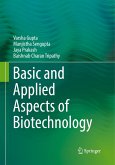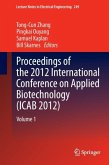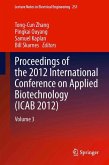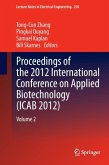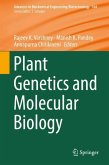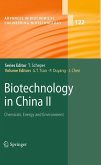Harnessing Biotechnology Tools for Product Development
Selected Papers from the International Biotechnology Conference Exhibition and Workshop (IBCEW 2024)
Herausgegeben:Isibor, Patrick Omoregie; Akinduti, Paul Akinniyi
Harnessing Biotechnology Tools for Product Development
Selected Papers from the International Biotechnology Conference Exhibition and Workshop (IBCEW 2024)
Herausgegeben:Isibor, Patrick Omoregie; Akinduti, Paul Akinniyi
- Gebundenes Buch
- Merkliste
- Auf die Merkliste
- Bewerten Bewerten
- Teilen
- Produkt teilen
- Produkterinnerung
- Produkterinnerung
This comprehensive guide that explores the application of biotechnology in creating innovative products across various industries for sustainable development in Nigeria, Africa, and globally. The book delves into the latest biotechnological techniques and tools, including genetic engineering, bioinformatics, and synthetic biology, highlighting their practical uses in pharmaceuticals, agriculture, environmental management, and industrial processes. It will give researchers, practitioners, and students a thorough understanding of how they can leverage biotechnology to drive product innovation,…mehr
Andere Kunden interessierten sich auch für
![Basic and Applied Aspects of Biotechnology Basic and Applied Aspects of Biotechnology]() Varsha GuptaBasic and Applied Aspects of Biotechnology110,99 €
Varsha GuptaBasic and Applied Aspects of Biotechnology110,99 €![Proceedings of the 2012 International Conference on Applied Biotechnology (ICAB 2012) Proceedings of the 2012 International Conference on Applied Biotechnology (ICAB 2012)]() Proceedings of the 2012 International Conference on Applied Biotechnology (ICAB 2012)152,99 €
Proceedings of the 2012 International Conference on Applied Biotechnology (ICAB 2012)152,99 €![Proceedings of the 2012 International Conference on Applied Biotechnology (ICAB 2012) Proceedings of the 2012 International Conference on Applied Biotechnology (ICAB 2012)]() Proceedings of the 2012 International Conference on Applied Biotechnology (ICAB 2012)152,99 €
Proceedings of the 2012 International Conference on Applied Biotechnology (ICAB 2012)152,99 €![Proceedings of the 2012 International Conference on Applied Biotechnology (ICAB 2012) Proceedings of the 2012 International Conference on Applied Biotechnology (ICAB 2012)]() Proceedings of the 2012 International Conference on Applied Biotechnology (ICAB 2012)152,99 €
Proceedings of the 2012 International Conference on Applied Biotechnology (ICAB 2012)152,99 €![Springer Handbook of Medical Biotechnology Springer Handbook of Medical Biotechnology]() Springer Handbook of Medical Biotechnology287,99 €
Springer Handbook of Medical Biotechnology287,99 €![Plant Genetics and Molecular Biology Plant Genetics and Molecular Biology]() Plant Genetics and Molecular Biology264,99 €
Plant Genetics and Molecular Biology264,99 €![Biotechnology in China II Biotechnology in China II]() Biotechnology in China II226,99 €
Biotechnology in China II226,99 €-
-
-
This comprehensive guide that explores the application of biotechnology in creating innovative products across various industries for sustainable development in Nigeria, Africa, and globally. The book delves into the latest biotechnological techniques and tools, including genetic engineering, bioinformatics, and synthetic biology, highlighting their practical uses in pharmaceuticals, agriculture, environmental management, and industrial processes. It will give researchers, practitioners, and students a thorough understanding of how they can leverage biotechnology to drive product innovation, improve efficiency, and address global challenges. Case studies and real-world examples illustrate the potential and impact of biotechnology in modern product development.
Provides an in-depth understanding of the latest biotechnology tools and techniques;Examines how biotechnology is used to address global issues like food security, environmental sustainability, and health;Examples and case studies offer insights into successful product development using biotechnological methods.
Provides an in-depth understanding of the latest biotechnology tools and techniques;Examines how biotechnology is used to address global issues like food security, environmental sustainability, and health;Examples and case studies offer insights into successful product development using biotechnological methods.
Produktdetails
- Produktdetails
- Verlag: Springer / Springer Nature Switzerland / Springer, Berlin
- Artikelnr. des Verlages: 978-3-031-86001-0
- Seitenzahl: 568
- Erscheinungstermin: 17. Mai 2025
- Englisch
- Abmessung: 241mm x 160mm x 36mm
- Gewicht: 953g
- ISBN-13: 9783031860010
- ISBN-10: 3031860012
- Artikelnr.: 73075965
- Herstellerkennzeichnung
- Springer-Verlag GmbH
- Tiergartenstr. 17
- 69121 Heidelberg
- ProductSafety@springernature.com
- Verlag: Springer / Springer Nature Switzerland / Springer, Berlin
- Artikelnr. des Verlages: 978-3-031-86001-0
- Seitenzahl: 568
- Erscheinungstermin: 17. Mai 2025
- Englisch
- Abmessung: 241mm x 160mm x 36mm
- Gewicht: 953g
- ISBN-13: 9783031860010
- ISBN-10: 3031860012
- Artikelnr.: 73075965
- Herstellerkennzeichnung
- Springer-Verlag GmbH
- Tiergartenstr. 17
- 69121 Heidelberg
- ProductSafety@springernature.com
¿ Patrick Omoregie Isibor, Ph.D., is a Lecturer and Researcher on Pollution Studies and Ecotoxicology in the Department of Biological Sciences at Covenant University. He received his Ph.D. and M.Sc. in Pollution Studies and Ecotoxicology from the University of Benin and a B.Sc. in Zoology from Ambrose Alli University. Dr. Isibor's research interests include ecotoxicology, hydrobiology, bioaccumulation, biosequestration, biodiversity conservation, and aquatic ecology. He is a member of the Association for Environmental Impact Assessment of Nigeria (AEIAN), the International Association of Risk and Compliance Professionals (IARCP), and the African Society for Toxicological Sciences (ASTS). He is an Editor for the African Journal of Health, Safety, and Environment and a reviewer for several reputable international journals. He is the co-editor of the books Biotechnological Approaches to Sustainable Development Goals (Springer, 2023), Environmental Nanotoxicology: Combatting the Minute Contaminants (Springer, 2024), and Nanochitosan-Based Enhancement of Fisheries and Aquaculture: Aligning with Sustainable Development Goal 14 – Life Below Water (Springer, 2024), Arctic Marine Ecotoxicology: Climate Change, Pollutants, and Their Far-Reaching Effects (Springer, 2024), and Safeguarding the Arctic Marine Environment: Toxicology, Climate Change Impacts, and Restoration Strategies (Taylor & Francis, 2025) Paul Akinniyi Akinduti, Ph.D., is a Lecturer and Researcher with the Department of Medical Laboratory Science at Babcock University, Illishan, Ogun State, Nigeria. He received his Ph.D. in Medical Microbiology and Bacteriology from Olabisi Onabanjo University. He is a Fellow of the Medical Laboratory Science Council of Nigeria and a recipient of the World Academy of Sciences and Bill and Melinda Gates Foundation Travel Awards. Dr. Akinduti’s areas of research interest include antimicrobial agents, antimicrobial resistance, molecular biology, bacterial pathogenesis, antimicrobial susceptibility testing, bacterial antibiotic resistance, bacteriology, antibacterial activity, bacterial drug resistance, diagnostic microbiology, molecular bacteriology, molecular microbiology, foodborne diseases, molecular typing, microbial genetics, bacterial toxins, bacterial conjugation, and pathogenesis.
Antimalarial Drug Resistance Markers in Plasmodium falciparum among Pregnant Women in Nigeria.- Assessment of Antibiotics Susceptibility Pattern of Gram-negative Bacteria Associated with Deteriorated Carrot and Cabbage from Markets in Nigeria.- Advancements in Bacillus anthracis Diagnostic and Treatment Techniques.- Biofilm Formation and Antibiotic Profile of Staphylococcus aureus Isolated from Food and Fomites in Selected Cafeterias.- Demographic Impact of Diarrheagenic Enterotoxigenic Escherichia coli Infection.- Genetic Modulation of Pgh1 in Multi-Drug Resistance Plasmodium falciparum to Antimalarial Drugs Used as Prophylaxis in Pregnancy.- Next-Generation Biotechnology Tool in Mitigation of Resistance to Carbamates Insecticides in Anopheles Gambiae.- Phylogenetic Analyses of Selected Underutilized Members of the Fabaceae Family based on DNA Barcodes.- Probiotic Properties And Safety Profilling of Lactobacillus Species Obtained From Fermented Beverages in Nigeria.- Hospital-Based Retrospective Study of Plasmodium falciparum and Salmonella enterica Co-infection on Gender Demography and Leucocytes.- Insecticide Resistance Markers in Anopheles gambiae Complex.- Reports on Plasmodium Falciparum Histidine-rich Protein 2/3 Gene Deletion and Utilized Methodological Approaches in Nigeria.- Antimalarial Drug Resistance: Newer Approaches to Mitigate the Process.- Impact of Climate Change on the Invasiveness of Mosquitoes in Nigeria.- Inhibitory Effects of Selected Phytoconstituents Against Steroid 5-Alpha Reductase Type-2 Target in Prostate Cancer.- Paratransgenesis: Overview, Current Perspectives, and Future Research Needs for Malaria Control.- Onychomycosis Disease Development, Treatment, and New Trends.- Potentials of Phages Against Antibiotic-Resistant Bacteria.- Prevalence of Malaria Infection Among Symptomatic Patients of Selected Healthcare Centers in Nigeria.- The Impact of Antibiotic Resistance Genes in Shigellosis.- Co-Expression of pfcrt and pfmdr1 Genes in Malaria Patients.- Differential Mosquito Attraction and Host Microbiota-Vector-Environment Complex.- PD-1/PD-L1 Inhibitors and Triple-Negative Breast Cancer (TNBC).- Local Knowledge Variation and use Pattern of Eggplant (Solanum species) in Southern Nigeria.- Beyond Foes and Friends: Deciphering the Gut Microbiome's Bidirectional Role in Breast Cancer.
Antimalarial Drug Resistance Markers in Plasmodium falciparum among Pregnant Women in Nigeria.- Assessment of Antibiotics Susceptibility Pattern of Gram-negative Bacteria Associated with Deteriorated Carrot and Cabbage from Markets in Nigeria.- Advancements in Bacillus anthracis Diagnostic and Treatment Techniques.- Biofilm Formation and Antibiotic Profile of Staphylococcus aureus Isolated from Food and Fomites in Selected Cafeterias.- Demographic Impact of Diarrheagenic Enterotoxigenic Escherichia coli Infection.- Genetic Modulation of Pgh1 in Multi-Drug Resistance Plasmodium falciparum to Antimalarial Drugs Used as Prophylaxis in Pregnancy.- Next-Generation Biotechnology Tool in Mitigation of Resistance to Carbamates Insecticides in Anopheles Gambiae.- Phylogenetic Analyses of Selected Underutilized Members of the Fabaceae Family based on DNA Barcodes.- Probiotic Properties And Safety Profilling of Lactobacillus Species Obtained From Fermented Beverages in Nigeria.- Hospital-Based Retrospective Study of Plasmodium falciparum and Salmonella enterica Co-infection on Gender Demography and Leucocytes.- Insecticide Resistance Markers in Anopheles gambiae Complex.- Reports on Plasmodium Falciparum Histidine-rich Protein 2/3 Gene Deletion and Utilized Methodological Approaches in Nigeria.- Antimalarial Drug Resistance: Newer Approaches to Mitigate the Process.- Impact of Climate Change on the Invasiveness of Mosquitoes in Nigeria.- Inhibitory Effects of Selected Phytoconstituents Against Steroid 5-Alpha Reductase Type-2 Target in Prostate Cancer.- Paratransgenesis: Overview, Current Perspectives, and Future Research Needs for Malaria Control.- Onychomycosis Disease Development, Treatment, and New Trends.- Potentials of Phages Against Antibiotic-Resistant Bacteria.- Prevalence of Malaria Infection Among Symptomatic Patients of Selected Healthcare Centers in Nigeria.- The Impact of Antibiotic Resistance Genes in Shigellosis.- Co-Expression of pfcrt and pfmdr1 Genes in Malaria Patients.- Differential Mosquito Attraction and Host Microbiota-Vector-Environment Complex.- PD-1/PD-L1 Inhibitors and Triple-Negative Breast Cancer (TNBC).- Local Knowledge Variation and use Pattern of Eggplant (Solanum species) in Southern Nigeria.- Beyond Foes and Friends: Deciphering the Gut Microbiome's Bidirectional Role in Breast Cancer.


